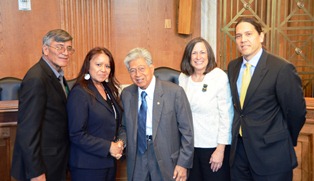Washington D.C. –
U.S. Senator Daniel K. Akaka (D-Hawaii), Chairman of the Senate Committee on Indian Affairs, held an oversight hearing on New Tax Burdens on Tribal Self-Determination yesterday.
The Committee heard testimony from federal officials and tribal leaders and organizations including Aaron Klein, Deputy Assistant Secretary for Economic Policy Coordination at the U.S. Department of the Treasury; Christie Jacobs, Director of the Office of Indian Tribal Governments at the Internal Revenue Service; William Lomax, President of the Native American Finance Officers Association; Lynn Malerba, on behalf of the United South and Eastern Tribes; Athena Sanchey-Yallup, Secretary of the Tribal Council for the Yakama Nation; and John Yellow Bird Steele, President of the Oglala Sioux Tribe.

The Committee heard concerns that the Internal Revenue Service has in recent years increased its auditing of benefits provided by tribal governments for the general welfare of tribal citizens. These benefits include funeral assistance, elder care, education assistance, cultural awareness programs, and other basic human services such as potable water or wood to help heat homes in freezing climates.
“The IRS wants to audit housing benefits, such as surplus FEMA trailers provided to tribal members, who have no access to a real house,” John Yellow Bird Steele testified. “My daughter’s family lives in a house with no running water- they have to use an outhouse for sanitation. Our people are found by the Census Bureau to be the poorest people in the country, with 47.3% of our people living below the poverty line. ”
“Given the extensive need in Indian Country for education, health care, housing, and other basic services, along with years of unmet and unfulfilled federal obligations, it stands to reason that the federal government should be doing all it can to support and incent these programs and not deter them through taxation and through the administrative expenses required to implement and comply with new and undefined IRS standards,” said William Lomax. “These are radical changes in taxation policy,” said Athena Sanchey-Yallup. Witnesses also voiced concern that the undefined IRS standards have led to inconsistency and confusion and that their cultural programs are suffering as a result.
“The IRS examiners who audit tribal programs in the field have little understanding that the ability of tribes to provide for the general welfare of their citizens is truly critical to self-determination of tribal governments,” said Steele. “Because of this failure of vision, the IRS has become a menacing, interfering and overwhelming bureaucracy in Indian Country.”
“Tribal governments must address the need to keep traditional religion and customs alive,” said Lynn Malerba. “With these new audits, the IRS has challenged the benefits provided to tribal cultural leaders who participate in activities that transmit tribal culture as being taxable compensation for services provided. For a tribal official to have to issue a form 1099 to a spiritual leader for the conduct of a traditional ceremony is not only burdensome, but also culturally offensive.”
When asked what the IRS and Department of Treasury are doing to clarify and improve the application of the general welfare doctrine for Tribes for tax purposes, Assistant Secretary Aaron Klein said, “The Treasury remains committed to working with Tribes and Tribal leaders through our consultation process. We have engaged in a series of meaningful actions in response to Tribal leaders’ concerns. Tribal leaders presented these issues to Treasury and IRS through general consultation and Treasury and IRS examined the issues and agreed to a more in-depth specific consultation, resulting in an extensive and highly productive dialogue.”
Chairman Akaka concluded the hearing by saying, “I am encouraged that the Agencies have taken steps to build a relationship with tribes and urge that dialogue to continue so that better understanding of tribal governments can occur. But as the IRS and Department of Treasury move forward on this issue, I would like to stress again the importance of the unique government-to-government and trust relationship between Native nations and the federal government. One out of every four Native people in the U.S. lives in poverty and federal assistance will never be enough to meet the serious need in Native communities. That is why we must support – not hinder — tribal self-determination programs that fill in the gaps where the federal government has fallen behind in its trust responsibility.”
More information and an archived webcast is available on the committee’s website: LINK
-END-
Contact: Emily Deimel
Contact Phone: 202-224-3667
Contact E-mail: emily_deimel@indian.senate.gov
